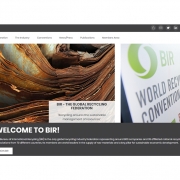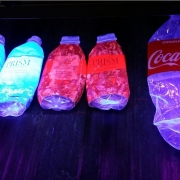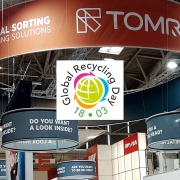International Environment Council: Game-Changing Developments for Plastics Recycling in Europe
“We need to convey the message that recycling is resource-efficient and climate-efficient,” insisted Emmanuel Katrakis, Secretary General of the European Recycling Industries’ Confederation, in his presentation to the BIR International Environment Council (IEC) meeting in Budapest on October 14, 2019.
Focusing on the main policy and regulatory drivers behind a “reshaping” of plastics recycling in Europe, he said the advent of binding targets for recycled content is “already a game-changer within the industry”. The EU has set a goal of at least 25 % recycled content in PET beverage bottles by 2025, and 30% for all plastic bottles by 2030.
The IEC’s Chairman, Olivier François of Galloo, reflected that incorporation of recycled plastic has become a positive point of focus in major brands’ advertising campaigns whereas many of them were “very resistant” to such initiatives in the past.
Three other game-changers identified by Mr Katrakis are: voluntary commitments/pledges entailing 10 million tonnes of recycled plastics incorporated into products in 2025; the corporate response to sustainability agendas and increasing consumer awareness; and bridging between the design and end-of-life phases of products, discussions on which are currently being held.
Mr Katrakis’ presentation also sounded a note of caution in identifying substances of very high concern – or SVHCs – as the “Sword of Damocles” hanging over the sector. The proposal for use of SVHCs within the EU to be subject to authorization under the REACh regulation could have “a huge impact” on the recyclability of products at end-of-life.
Fellow guest speaker Jeffrey D. Kimball, Commercial Director of Loacker Hulladékhasznosító Kft., examined the recycling landscape in Hungary. He said it is “difficult to see” how the country will raise its recycling and composting rate from 35% at present to meet the EU target of 55% set for 2025. Current government/industry discussions about co-operation in meeting these targets are important, he added, because the centralized auction system launched in 2018 for communally-collected recyclables is “unacceptable”.
BIR Trade & Environment Director Ross Bartley began his review of latest activities in the regulatory sphere by confirming that the world recycling organization has joined the United Nations’ Plastic Waste Partnership whose goal is the environmentally sound management of plastic waste as well as minimized generation. He also noted that the Basel Convention BAN Amendment has received the required number of ratifications for its adoption and that it will take effect on December 5, 2019.
The ban is of great political significance but, over the years, most countries have adjusted to it coming into force, Mr Bartley added.
Delegates also learned that BIR is compiling a list of plastics recycling operations (mechanical, feedstock and chemical) to assist the governments of OECD countries in making informed decisions about controlling movements to these facilities. To help towards this end, Mr Bartley asked that plastic recycling company names, websites and country locations be emailed to bir@bir.org before the deadline of October 31, 2019.
Source: Bureau of International Recycling aisbl








